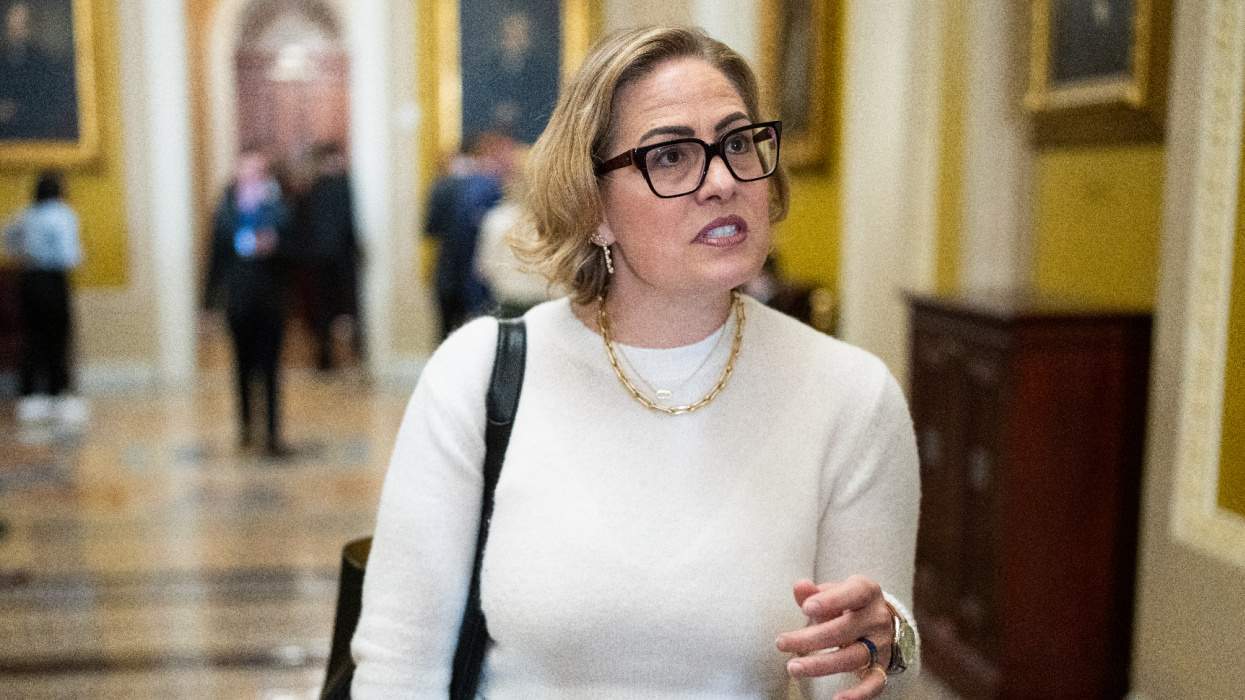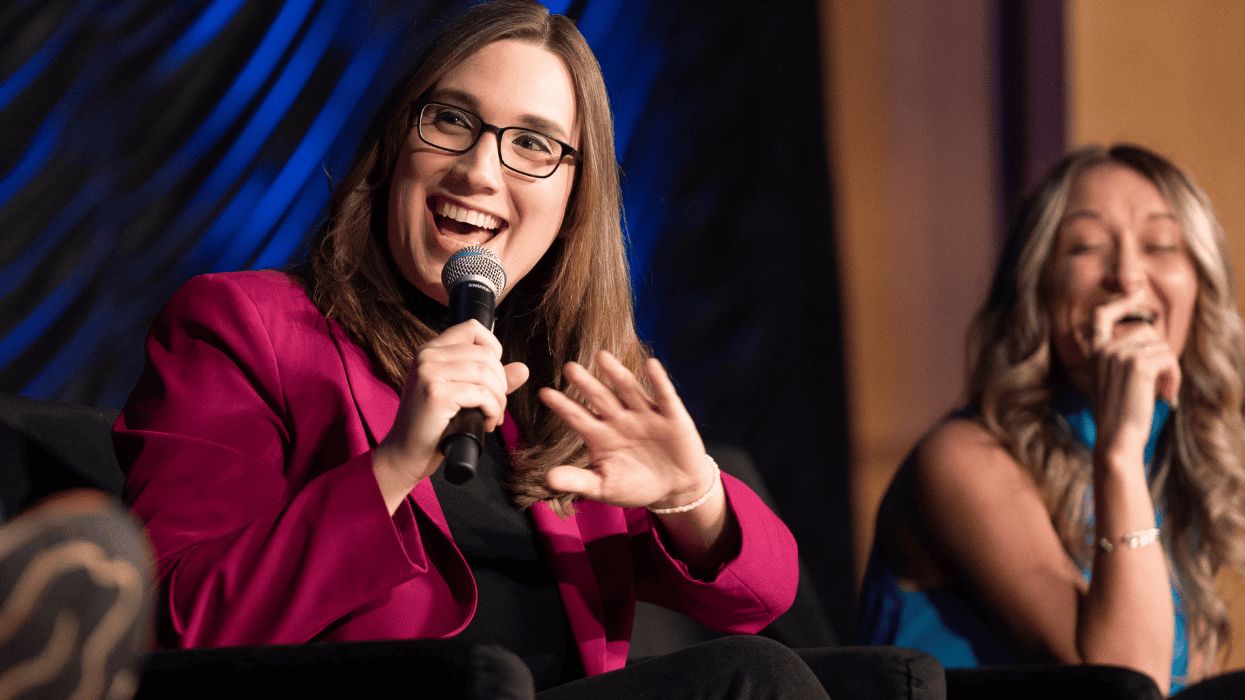Former U.S. Rep. Katie Hill paid a high price for being a visible bisexual presence on Capitol Hill, so much so that she resigned her office. But she hasn't stopped being an advocate for bi visibility.
"If you're in elected office or if you're a public figure at all, then you have the opportunity to give voice to this, to validate people's experiences," Hill said during a Zoom event sponsored by Still Bisexual last week for Bisexual Visibility Day.
Hill, a Democrat, ran for the U.S. House of Representatives in 2018 as an out bi woman and won, defeating anti-LGBTQ+ Republican incumbent Steve Knight in California's 25th Congressional District and flipping the seat from red to blue. She was considered an up-and-comer in the House, working closely with Speaker Nancy Pelosi and other leaders.
But she ended up resigning in October 2019 after a right-wing blog published a nude photo of her and allegations of relationships with a female campaign staffer (in a "throuple" arrangement involving Hill's husband) and, separately, with a male House aide. Other outlets published photos as well. She acknowledged she had a consensual relationship with the campaign worker but said she had never been romantically or sexually involved with anyone on her House staff, which would have been a violation of ethics rules. Hill said a Republican operative told her hundreds of photos were circulated by her estranged husband, although he has claimed he was hacked.
Hill is still in the process of finalizing her divorce from her husband, who she says was emotionally abusive, but she has moved on and bounced back in many ways. She has a book out, She Will Rise: Becoming a Warrior in the Battle for True Equality, and she has started a political action committee, Her Time, to support women candidates for office, especially those who don't qualify for larger funders such as Emily's List.
In the Still Bisexual event, moderated by writer and podcaster Gaby Dunn, Hill talked about what she's gone through and what she hopes to do going forward.
She was advised to stay closeted about being bi while running for office, even by some members of the LGBTQ+ community. She was married to a man, so she could be seen as heterosexual. "It would have been much easier to run just not addressing it, but for me, it's an important part of my identity," Hill said.
Bi people make up the majority of the LGBTQ+ community, but that's not often recognized, she said. "Many, many people don't publicly identify as bi," she noted, instead identifying as gay or straight based on the relationship they're in. "It's far more socially acceptable to be gay than to be bi, still," she said. But she was determined to be visible. "Visibility itself, representation itself, that's critical," she said.
Hill had hoped for some show of solidarity from the few well-known bisexual politicians, but that wasn't forthcoming, she said. "I don't want to be disparaging at all, but I was expecting that they would reach out or something, but they did not at all," she said. She does cut them some slack, mentioning that Kyrsten Sinema was in a tough race in Arizona, trying to flip a U.S. Senate seat from Republican to Democratic (Sinema, who had served in the U.S. House and the state legislature, ultimately won). Gov. Kate Brown of Oregon is another prominent bi pol, but there isn't that much interaction between governors and members of Congress, Hill said, although she did reach out to Brown and never heard back.
"I felt like I ended up taking on this mantle of being an openly bi person," Hill said, adding that she hopes that's not the case for the next bi person in public life.
Recently a bisexual male politician reached out to her for advice on coming out -- Andrew Gillum, the former mayor of Tallahassee, Fla., and 2018 Democratic nominee for Florida governor, who came out as bi in September. "I was really honored. ... I was really happy that I could kind of advise or provide support or whatever," Hill said.
She has received support from another woman who was in a publicly scrutinized relationship -- Monica Lewinsky, who was involved with President Bill Clinton. Lewinsky, who endured a lot of shaming, contacted Hill, and "it just meant a lot to have someone who's been through hell on that front to say, hey, I'm here," Hill said.
Bi people know a lot about shaming; they're perceived as duplicitous, undecided, hypersexual, unable to be monogamous, although as with people of any other orientation, some bi people choose monogamy and some do not. Dunn said she felt Hill suffered because of a lack of understanding of bisexuality, and Hill acknowledged, "Biphobia is a real thing."
So is a double standard in treatment of male and female politicians, including where nude pictures are concerned. When the pictures of her came out, "people wanted to get off on it," Hill said. To the suggestion that she shouldn't have allowed the pictures to be taken, she pointed out that consent to be photographed doesn't mean consent for the world to see the pictures.
She's committed to helping other women succeed in politics. About a quarter of the nation's elected officials are women, still not in line with their numbers in the population. "We're represented at half of what we should be," Hill noted. She wants her book to be a call to action; it tells her story but also a larger story of women in politics, she said.
In addition, she seeks to raise awareness of emotional abuse, which she said she and the woman she was involved with both endured from her husband. It can be as bad as physical abuse, she said. In the wake of all this, Hill is not in a relationship and is uncomfortable being in one, she added.
Her other efforts include launching a podcast, Naked Politics, and she may write another book, she said. She's also calling on everyone to get out and vote. As for anything else, she said, "I'm still figuring that out."















